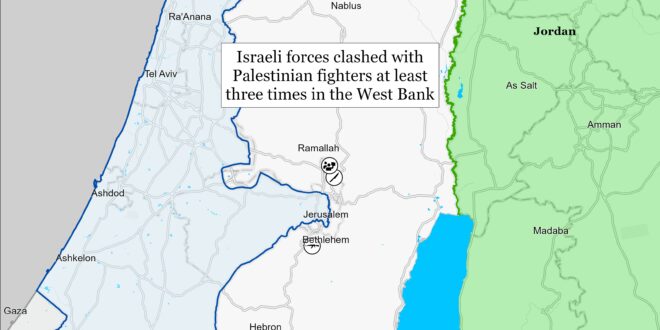IRGC Quds Force Commander Brig. Gen. Esmail Ghaani said on March 6 that Iran’s proxies and partners have taken a more “offensive stance” in the Israel-Hamas war, which frames the war in terms consistent with Iran’s regional military doctrine.[i] Ghaani issued this statement during a speech to the Assembly of Experts. Iran and the Axis aim to seize the operational initiative to dictate the tempo and terms of action in conflict and force Iran’s adversaries to react constantly.[ii] IRGC Commander Maj. Gen. Hossein Salami said in 2022 that Palestinian militias needed to focus on successive offensive ground operations into Israel instead of defensive, static wars using their rocket systems.[iii] CTP-ISW previously assessed that Hamas’ decision to conduct a ground attack into Israel on October 7 may have been based on what Salami outlined in August 2022.[iv]
The Houthis launched anti-ship missiles on March 6 that targeted a Greek-operated Barbados-flagged bulk-carrier in the Gulf of Aden and damaged the ship, killing two crewmembers and injuring at least six more.[v] The Houthi attack on March 6 forced the crew to abandon ship.[vi] The crew was made up of south and southeast Asian nationals. The bulk-carrier, True Confidence, was carrying steel products and trucks from China to Jeddah, Saudi Arabia.[vii]
The March 6 attack is the first that has caused fatalities since the Houthis began attacking civilian ships in the Red Sea in November 2023. The Houthi attacks prior to March 6 were not calibrated to avoid casualties, however. These attacks—using drones, ballistic, and cruise missiles—risk the death of civilian crewmembers in every instance. A Houthi attack on February 18 that targeted the MV Rubymar caused the crew to abandon ship on February 18 and resulted in the sinking of the vessel on March 3.[viii]
Houthi-affiliated media claimed that the United States and the United Kingdom conducted two airstrikes targeting Hudaydah International Airport on March 6.[ix]
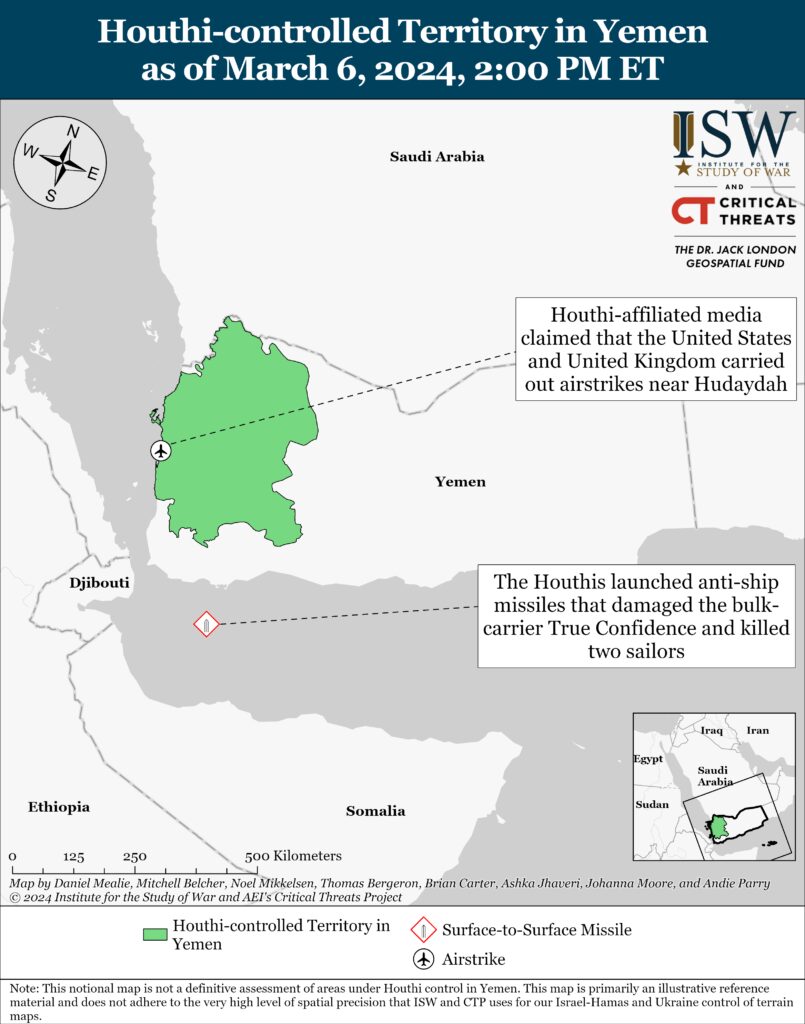
Palestinian militias claimed most of their attacks targeting Israeli forces in the Gaza Strip in southern Gaza City on March 6. Palestinian fighters used RPGs, sniper rifles, and mortars to target Israeli forces in Zaytoun neighborhood of Gaza City.[x] PIJ fighters mortared an IDF combat outpost south of Gaza City.[xi] The IDF concluded a two-week long operation in Zaytoun on March 2 to re-clear Hamas fighters there.[xii] Ongoing Palestinian attacks in the area suggest that Israeli forces did not fully clear Zaytoun and that Palestinian militias in southern Gaza City likely retain some capacity to fight.
Key Takeaways:
Iran and the Israel-Hamas War: IRGC Quds Force Commander Brig. Gen. Esmail Ghaani said on March 6 that Iran’s proxies and partners have taken a more “offensive stance” in the Israel-Hamas war, which frames the war in terms consistent with Iran’s regional military doctrine.
Iran and the Axis aim to seize the operational initiative to dictate the tempo and terms of action in conflict and force Iran’s adversaries to react constantly.
IRGC Commander Maj. Gen. Hossein Salami said in 2022 that Palestinian militias needed to focus on successive offensive ground operations into Israel instead of defensive, static wars using their rocket systems.
Yemen: The Houthis launched anti-ship missiles on March 6 that targeted a Greek-operated Barbados-flagged bulk-carrier in the Gulf of Aden and damaged the ship, killing two crewmembers and injuring at least six more.
Northern Gaza Strip: Palestinian militias claimed most of their attacks targeting Israeli forces in the Gaza Strip in southern Gaza City on March 6.
Negotiations: Hamas said on March 6 that it will continue ceasefire negotiations and claimed that it has “shown flexibility” in the talks. Egyptian officials with knowledge of the talks told the Wall Street Journal on March 6 that Egyptian intelligence chief Abbas Kamal prevented Hamas from walking away from negotiations.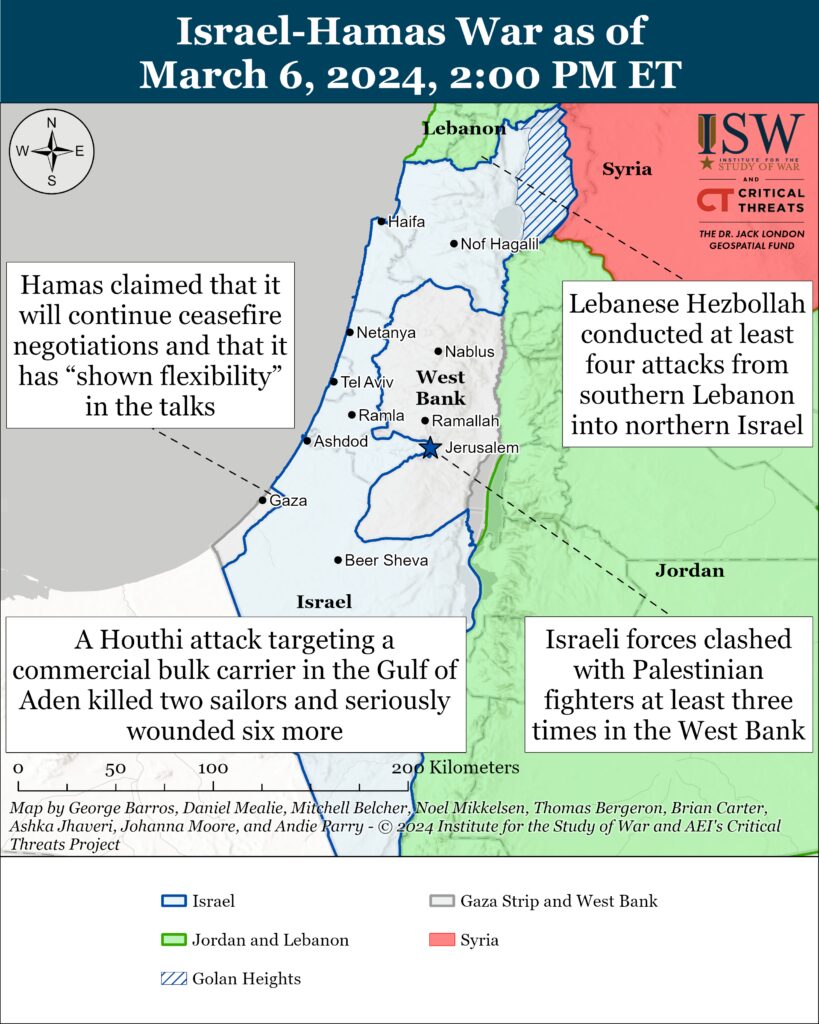
Gaza Strip
Axis of Resistance campaign objectives:
Erode the will of the Israeli political establishment and public to launch and sustain a major ground operation into the Gaza Strip
Degrade IDF material and morale around the Gaza Strip.The IDF conducted several airstrikes targeting Hamas and Palestinian Islamic Jihad (PIJ) infrastructure and personnel in the northern Gaza Strip. The IDF Air Force killed two Palestinian fighters in Beit Hanoun who had fled to an unspecified “military location.”[xiii] The IDF also killed two Palestinian fighters involved in the October 7, 2023, attack and three commanders in Hamas’ elite Nukhba forces.[xiv] The IDF also struck Hamas and PIJ infrastructure in Jabalia, where Palestinian fighters had launched rockets into Israel within the last week.[xv] The IDF struck apartments where Palestinian fighters stored weapons, as well as other weapons depots, rocket launchers, and tunnels.[xvi] Palestinian Mujahideen Movement fighters also targeted an Israeli tank with a rocket-propelled grenade (RPG) east of Jabalia on March 6.[xvii]
The IDF reported on March 6 that it killed the Hamas’ commander who oversaw rocket fire from the central Gaza Strip into Israel.[xviii] The IDF reported that the leader, Amar Atiya Darwish Aladani, was a military commander in Hamas for the past several decades and directed attacks targeting Israeli forces in the Strip and into Israel during the current war. Aladani also played a significant role in planning the October 7, 2023, attack, according to the IDF.
Israeli forces continued to conduct clearing operations in northern Khan Younis on March 6. The IDF 89th Commando Brigade (98th Division) raided buildings in the Hamad neighborhood that Hamas fighters had used previously. The 89th Commando Brigade captured several Palestinian fighters, including a commander from a Hamas sniper cell.[xix] Israeli forces detained approximately 250 PIJ and Hamas fighters in the neighborhood.[xx] The Bislamach Brigade demolished buildings and clashed with Palestinian fighters in Qarara.[xxi] The al Aqsa Martyrs’ Brigades, the self-proclaimed military wing of Fatah and aligned with Hamas in the war, fired at two Israeli soldiers in Qarara.[xxii] A Palestinian activist reported clashes between Israeli forces and Palestinian fighters in Hamad and Qarara.[xxiii]
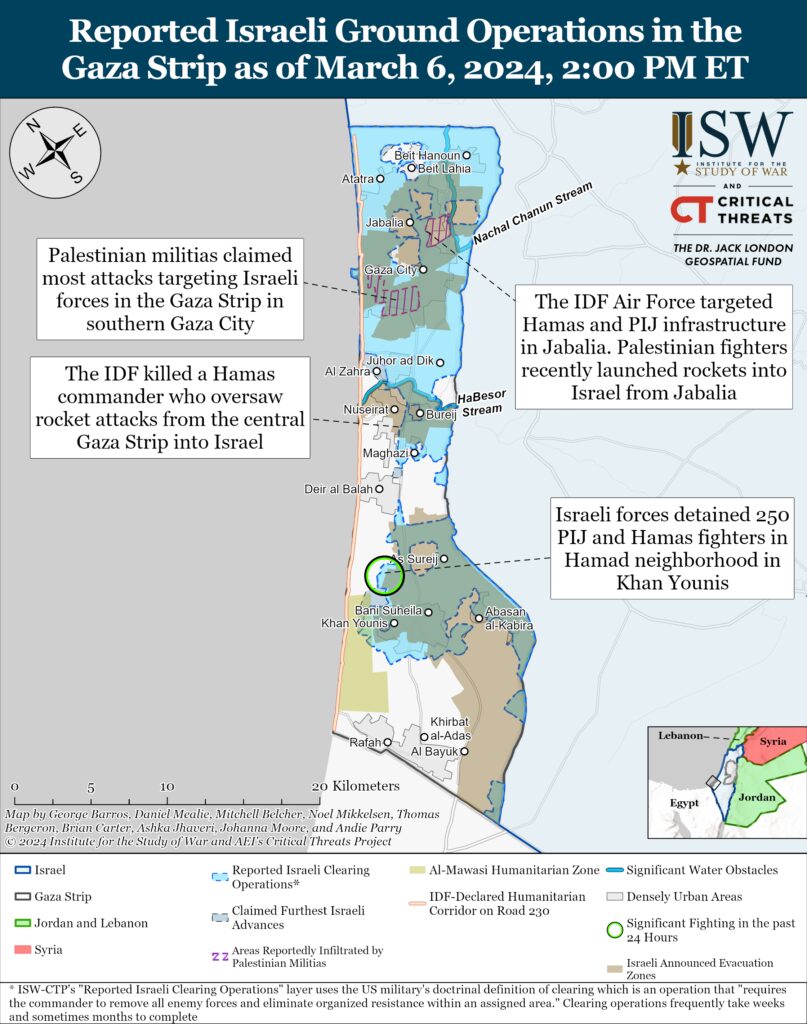
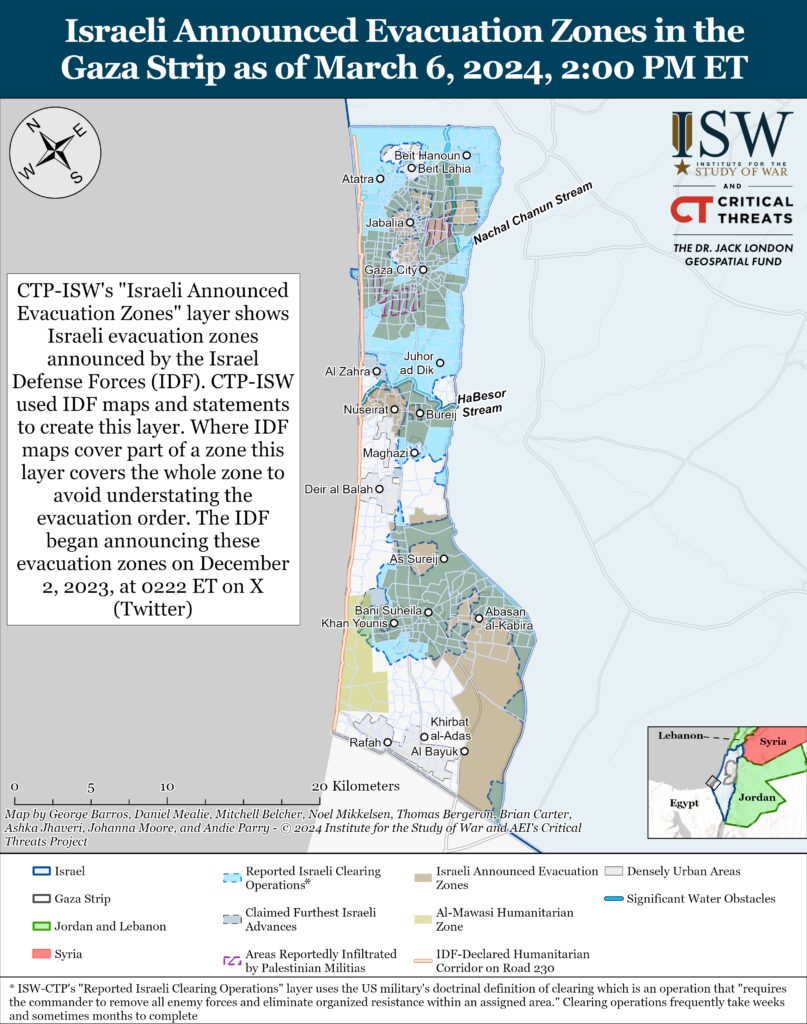
Hamas said on March 6 that it will continue ceasefire negotiations and claimed that it has “shown flexibility” in the talks.[xxiv] Hamas reiterated its demands for a permanent ceasefire, the return of displaced people, the complete withdrawal of Israeli forces, and sufficient humanitarian aid.[xxv] Hamas has consistently held its position on a permanent ceasefire.[xxvi] Some of these elements, particularly the permanent ceasefire and a complete withdrawal of Israeli forces, are an obstacle in the ongoing negotiations.
Egyptian officials with knowledge of the talks told the Wall Street Journal on March 6 that Egyptian intelligence chief Abbas Kamal prevented Hamas from walking away from negotiations.[xxvii]
Hamas’ proposal for a ceasefire includes the release of high-level Palestinian prisoners, according to Jordanian media.[xxviii] The prisoners include a ”top“ Hamas “bombmaker” and the leader of the Popular Front for the Liberation of Palestine (PFLP). The PFLP is a secular leftist Palestinian faction fighting with Hamas in the war. Palestinian militias in the Gaza Strip are operating in a loose coalition and have aligned their stances in ceasefire negotiations.[xxix] Hamas has previously demanded the release of other high-level prisoners, including members of its elite Nukhba force.[xxx]
Parts of the Gaza Strip are experiencing a near-total telecommunications disruption. NetBlocks reported on March 5 that the disruption is particularly serious in the southern Gaza Strip.[xxxi]
Palestinian militias did not claim any indirect fire attacks from the Gaza Strip into Israel on March 6.
West Bank
Axis of Resistance campaign objectives:
Draw IDF assets and resources toward the West Bank and fix them thereIsraeli forces have clashed with Palestinian fighters at least three times in the West Bank since CTP-ISW’s last data cut off on March 5.[xxxii] The IDF detained 17 Palestinians in the West Bank overnight.[xxxiii]
Palestinian youth demonstrated in Qalandiya refugee camp north of Jerusalem against several countries for the temporary suspension of funding for the UN Relief and Works Agency for Palestinian Refugees in the Near East’s operations.[xxxiv]
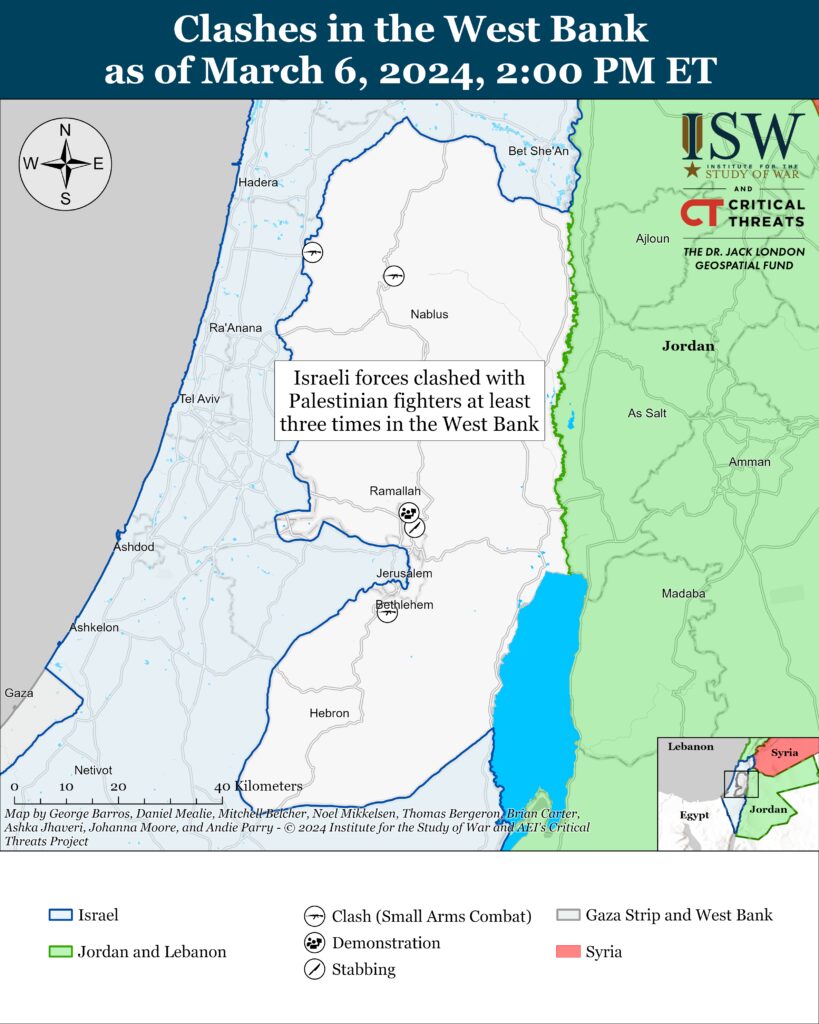
This map is not an exhaustive depiction of clashes and demonstrations in the West Bank.
Southern Lebanon and Golan Heights
Axis of Resistance campaign objectives:
Draw IDF assets and resources toward northern Israel and fix them there
Set conditions for successive campaigns into northern IsraelLebanese Hezbollah has conducted at least four attacks from southern Lebanon into northern Israel since CTP-ISW’s last data cutoff on March 5.[xxxv]
The Islamic Resistance in Iraq —a coalition of Iranian-backed Iraqi militias— claimed it launched drones targeting Kiryat Shmona airport on March 6.[xxxvi] The group separately claimed it launched drones targeting the Haifa power station near the airport on March 5.[xxxvii] The IDF has not acknowledged either attack. CTP-ISW cannot confirm that these attacks took place.
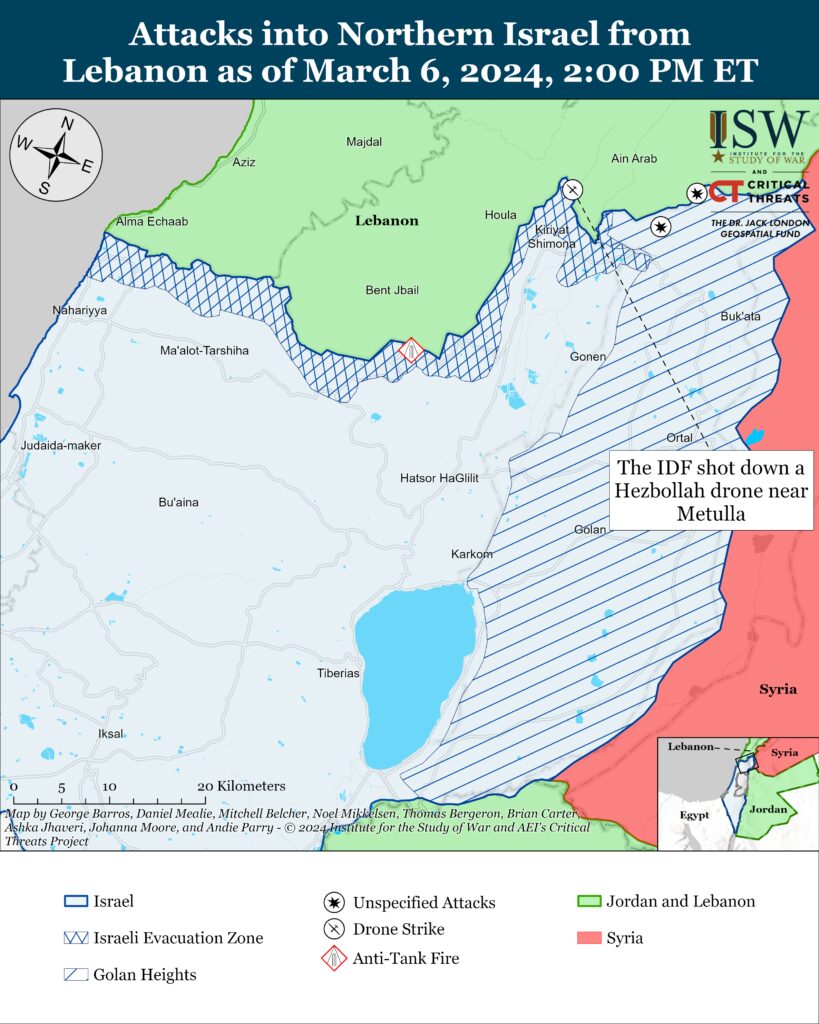
Recorded reports of attacks; CTP-ISW cannot independently verify impact.
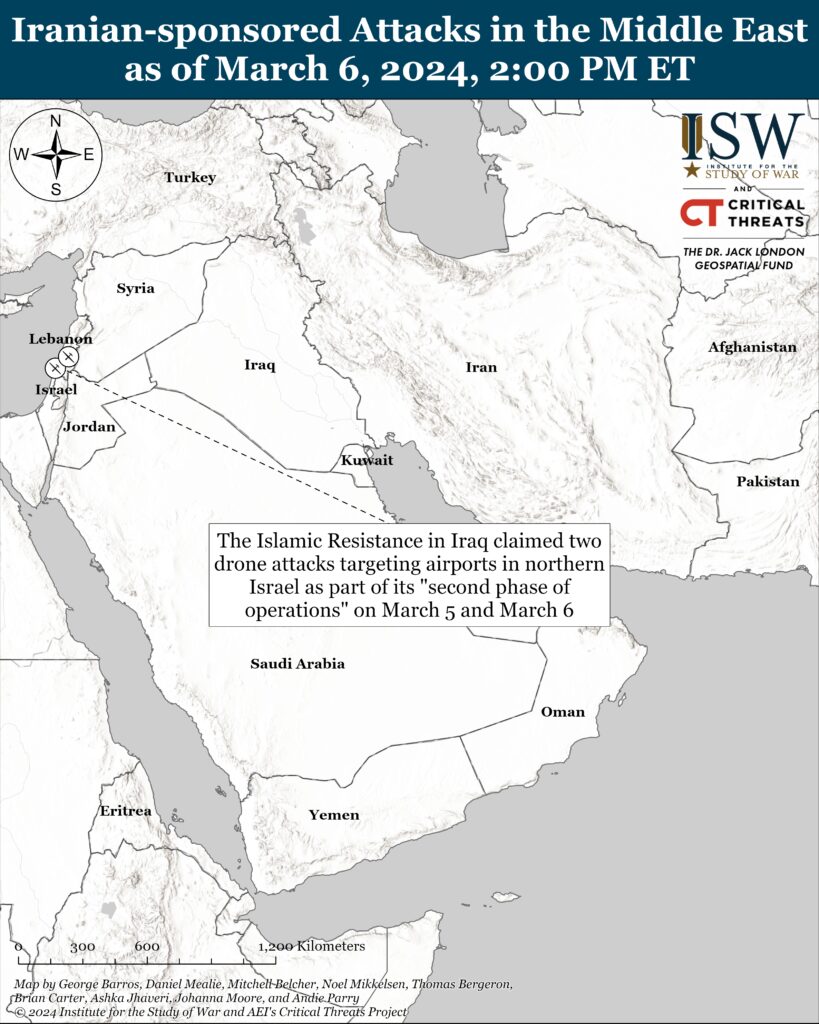
Recorded reports of attacks; CTP-ISW cannot independently verify impact.
Iran and Axis of Resistance
Axis of Resistance campaign objectives:
Demonstrate the capability and willingness of Iran and the Axis of Resistance to escalate against the United States and Israel on multiple fronts
Set conditions to fight a regional war on multiple frontsIraqi President Abdel Latif al Rashid met with Russian Ambassador to Iraq Elbrus Kutrashev on March 6 to discuss Russian investment in Iraq and strengthening bilateral relations.[xxxviii] Russian and Iraqi officials have discussed Russian investment in Iraq in a series of meetings since January 2024, including several meetings focused on security cooperation.[xxxix] CTP-ISW assessed on February 20 that Russia may be setting conditions to supplant the United States as a security partner in Iraq in anticipation of the United States possibly reducing its military presence there.[xl]
Former Iraqi Prime Minister Nouri al Maliki met with US Ambassador to Iraq Alina Romanowski and US Deputy Assistant Secretary for Iran and Iraq Affairs Victoria Taylor on March 6.[xli] Maliki said that the Iraqi government is eager to implement the US-Iraq Strategic Framework Agreement after the International Coalition’s mission in Iraq ends.[xlii] The United States and Iraq have held a series of ”working group” meetings since January 2024 to discuss the International Coalition’s mission in Iraq and present an assessment of the capabilities of Iraqi Security Forces and of the threat posed by ISIS.[xliii] These meetings are a precursor to negotiations that Iraq seeks to use to transition from a multilateral security relationship between Iraq and the International Coalition to unspecified bilateral relationships between Iraq and individual coalition member countries.[xliv]
A Houthi official confirmed the group’s close ties with Iran.[xlv] He said that Iran provided technology and military expertise that enhanced the Houthis’ military and intelligence operations.[xlvi] He reiterated prior Houthi claims that the group will stop attacking ships transiting through the Red Sea when there is a ceasefire in the Gaza Strip. .[xlvii] The Houthis conducted attacks targeting international shipping in the Red Sea and Gulf of Aden prior to the Israel-Hamas War. The group could conduct attacks targeting international shipping in the future at minimal cost for reasons of its own choosing, even if a ceasefire is secured.
Jordanian border guards shelled unspecified targets inside Syria near the border with Jordan on March 6.[xlviii] A local Syrian outlet reported that the Jordanian border guards targeted several farms outside Nassib, Daraa Governorate, on the Syria-Jordan border, without providing additional details.
The shelling is likely part of increasing Jordanian operations against smuggling networks in southwestern Syria. Jordanian forces have clashed with Iranian-backed smugglers along the Jordan-Syria border four other times since December 2023, including once on February 7.[xlix] The Jordanian Royal Air Force has also struck Iranian-backed drug smugglers three times since December 2023.[l] Western media reported in January that Western and Jordanian officials said that Lebanese Hezbollah and other Iranian-backed groups are driving the increase in drug smuggling into Jordan.[li] The Syrian regime, Lebanese Hezbollah, and other Iranian-backed militias mass produce Captagon in Syria and smuggle it through Jordan to the Gulf Arab states. This smuggling and distribution cartel generates billions of dollars in revenue for Iran and its Axis of Resistance.[lii]
Israel likely conducted a drone strike targeting Iranian Islamic Revolutionary Guard Corps (IRGC) assets in eastern Syria on March 6. Syrian opposition media reported that a drone strike targeted an IRGC military vehicle in Mayadin, Deir ez Zor Governorate.[liii] One Syrian outlet reported that the strike injured two IRGC personnel.[liv] The UK-based Syrian Observatory for Human Rights reported that the strike killed three Iranian-backed militia members.[lv] This outlet sometimes incorrectly reports casualty counts and other events and information.[lvi] The IDF Air Force has increased its strikes into Syria since December 2023 to disrupt the IRGC Quds Force and Lebanese Hezbollah’s efforts to bring personnel and weapons into Lebanon from Syria.[lvii] Previous strikes killed several IRGC officers in Syria since December 2023, including an IRGC Navy officer on March 1.[lviii]
Iranian state media claimed that Iran offloaded crude oil from the Marshall Islands-flagged Advantage Sweet on March 6.[lix] Iranian media claimed on March 6 that Iran offloaded the oil in response to longstanding American and European oil sanctions.[lx] The Artesh Navy seized the Advantage Sweet in the Gulf of Oman in April 2023 as the vessel was transporting oil from the UAE to the United States.[lxi] American oil company Chevron chartered the Advantage Sweet at the time of the seizure.[lxii] Iran initially seized the Advantage Sweet in retaliation for US sanctions enforcements efforts, which included confiscating and unloading Iranian oil from the Suez Rajan.[lxiii]
The Iranian Defense Minister Brig. Gen. Mohammad Reza Ashtiani met with the Armenian Defense Minister Suren Papikyan in Tehran on March 6.[lxiv] Ashtiani said that countries in the region should be responsible for the security of the Caucasus region.Ashtiani was likely alluding to Iran’s belief that its adversaries outside the Caucasus, specifically the United States and Israel, are seeking to exploit conflict in the Caucasus to “undermine the security of the entire region.“[lxv] The Iranian regime has also historically accused Baku of allowing Israel to use Azerbaijani territory to launch operations against Iran, as CTP-ISW has reported on numerous occasions.[lxvi]
 Eurasia Press & News
Eurasia Press & News
